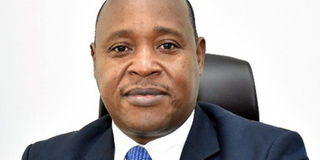Prime
EAC leaders to meet over common currency

Peter Mathuki, EAC secretary general. Photo | File
What you need to know:
- The central bank was meant to attract more foreign capital in the region. Speaking to the media at a press conference yesterday, Mr Peter Mathuki, the EAC secretary general, revealed that Finance ministers across the region will meet in Arusha, Tanzania, to submit some of the proposals.
Finance ministers across the East African Community (EAC) have scheduled a meeting to discuss and submit proposals on setting up a central bank of East Africa and a single currency across the member states.
In 2021, the East African Legislative Assembly (Eala) passed laws to establish East African monetary institutes, the East African statistics bureau, the East African surveillance, compliance and enforcement commission.
The central bank was meant to attract more foreign capital in the region. Speaking to the media at a press conference yesterday, Mr Peter Mathuki, the EAC secretary general, revealed that Finance ministers across the region will meet in Arusha, Tanzania, to submit some of the proposals.
“The technical working group has completed its report, which has also been submitted to the council of ministers of the EAC, and Finance ministers are to meet soon and submit their proposal,” Mr Mathuki said.
He added: “The council reviewed the reports to establish an East African monetary institute, which will act as a roadmap towards a common currency by 2031.”
The monetary union is the third step in the EAC regional integration that is expected to be capped by the political federation.
Mr Mathuki said the EAC member states have been working on full attainment of a customs union and a common market, amid a number of challenges, including non-tariff barriers, trade blockades and closure of border points.
Mr Mathuki revealed that the DR Congo’s admission to the bloc has boosted regional trade to stand at $ 11.8 billion, accounting for 16 percent of the global trade, saying this is a boost from the value of $ 10.9 billion.
“The EAC intra-trade value for 2023 has indicated a positive trend with 16 percent in January and 19 percent in February of total global trade,” Mr Mathuki said.
He also urged regulators of telecommunication services to harmonise costs to ease communication.





